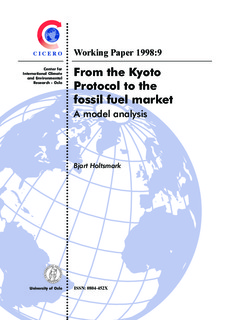| dc.contributor.author | Holtsmark, Bjart | nb_NO |
| dc.date.accessioned | 2014-03-17T14:31:39Z | |
| dc.date.available | 2014-03-17T14:31:39Z | |
| dc.date.issued | 1998 | nb_NO |
| dc.identifier.issn | 0504-452X | nb_NO |
| dc.identifier.uri | http://hdl.handle.net/11250/192458 | |
| dc.description.abstract | Implementation of the Kyoto Protocol will change the energy markets. The resulting price shifts will represent important terms-of-trade changes. The paper explores how the different countries’ relationship to the fossil fuel markets will cause variations in the costs from implementation of Kyoto Protocol. The paper furthermore analyses how the geographical distribution of abatement efforts will be altered if emission trading is allowed.
According to the presented analysis Russia and the other economies in transition to a market economy (EIT-countries) will experience net gains from implementation of the Kyoto Protocol. An important prerequisite is however, that emission trading takes place without restrictions. The USA is a likely dominant quota buyer. This quota import gives nevertheless surprisingly small net cost reductions. The inclusion of benefits from revenue recycling, so-called double dividends, is an explanatory factor at this point. These benefits are probably important for the different countries’ choice between quota trade and domestic abatement measures. | nb_NO |
| dc.language.iso | eng | nb_NO |
| dc.publisher | CICERO Center for International Climate and Environmental Research - Oslo | nb_NO |
| dc.relation.ispartof | CICERO Working Paper | nb_NO |
| dc.relation.ispartofseries | CICERO Working Paper;1998:09 | nb_NO |
| dc.title | From the Kyoto Protocol to the fossil fuel market: A model analysis | nb_NO |
| dc.type | Working paper | nb_NO |
| dc.source.pagenumber | | nb_NO |
